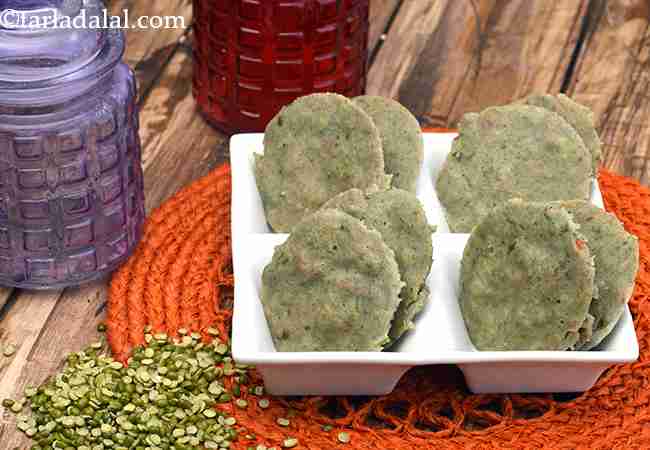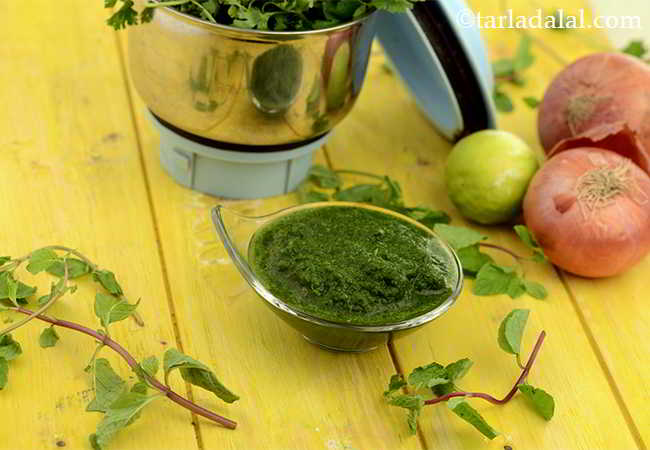Sprouted Matki Uttapam recipe makes 6 Uttapam of 30 grams each.
Calories of Sprouted Matki Uttapam 92 calories for 1 uttapam of Sprouted Matki Uttapam, Cholesterol 0 mg, Carbohydrates 13.2g, Protein 5.2g, Fat 2.1g. Find how much fibre, iron, calcium, zinc, magnesium, phosphorus, sodium, potassium, folic acid is present in Sprouted Matki and Coriander Uttapam.
See Sprouted Matki Uttapam recipe | sprouted matki vegetable pancake | healthy matki vegetable chilla | with 25 amazing images.
sprouted matki uttapam is a nutritious and flavorful Indian breakfast dish that can be made quickly. Learn how to make healthy matki vegetable chilla .
sprouted matki uttapam is a type of uttapam made with sprouted matki (moath beans. It is a healthier and more nutritious alternative to traditional onion uttapam, which is made with rice.
To make sprouted matki uttapam batter combine the sprouted matki and ½ cup of water in a mixer and blend till smooth. Transfer the mixture into a deep bowl, add besan, coriander, tomatoes, carrot, ginger-green chilli paste, cumin seeds, hing, salt and mix well.
To make sprouted matki uttapam grease a non-stick pan with ¼ tsp of oil. Pour a ladleful of the batter and spread in a circular motion to make a 125 mm. (5") diameter thick circle. Cook till they turn brown in colour from both the sides using a little oil.
Serve sprouted matki uttapam immediately with green chutney or coconut chutney .
With only 92 calories per sprouted matki uttapam , sprouted matki vegetable pancake is a low-calorie food that is ideal for weight loss.
Some more delicious diabetic-friendly everyday treat recipes - Green Moong Dal and Vegetable Idli, Healthy Moong Dal Idlis , Yellow Moong Dal and Spring Onion Paratha , Buckwheat Pancakes and Adai.

Green Moong Dal and Vegetable Idli, Healthy Moong Dal Idlis
Is Sprouted Matki Uttapam healthy?
Yes, this is healthy. But restrictions apply to some.
Let's understand the Ingredients.
What's good.
Sprouted Matki : Matki sprouts abound in fiber and thus form an ideal choice for weight watchers, diabetes, heart disease etc. The process of sprouting increases the protein count of matki by 30%. Matki sprouts are also a good way to manage healthy cholesterol in the body. Those suffering from acidity should opt for matki sprouts rather than the cooked matki. See benefits of sprouted matki in sprouted matki glossary.
Coriander (kothmir, dhania) : Coriander is a fresh herb often used as a flavour enhancer in Indian cooking. It is mainly used as a garnish. This is the best way to use it - no cooking. This preserves its vitamin C content which helps to build our immunity and bring that sparkle to the skin. The antioxidants vitamin A, vitamin C and the quercetin present in coriander works towards strengthening our immune system. Coriander is a fairly good source of iron and folate – the 2 nutrient which help in the production and maintenance of red blood cells in our blood. Good for reducing cholesterol and good for diabetics. Read 9 benefits of coriander to understand details.
Green Chillies : Antioxidant vitamin C in green chillies protects the body from effects of harmful free radicals and prevents stress. It is probably the high fiber which helps in controlling blood sugar levels. This it is a welcome addition to a diabetic diet. Suffering from anaemia? Add green chillies to your list of iron rich foods too. For complete details see benefits of green chilli.
Benefits of Cumin Seeds ( jeera) : The most common benefit of jeera known to many is to soothe the stomach, intestine and the entire digestive tract. Cumin seeds are apparently a very good source of iron. A tbsp. of cumin seeds can fulfil nearly 20% of days iron requirement. Even small quantity of cumin seeds has huge amounts of calcium ( see calcium rich Indian foods ) – a bone supporting mineral. They aid is digestion, weight loss and help reduce inflammation. See detailed benefits of cumin seeds, jeera.
Hing ( Asafoetida) : The active compound 'coumarin' helps in managing blood cholesterol and triglyceride levels. Asafoetida is known to have anti-bacterial properties, which helps to keep asthma at bay. Asafoetida is an age-old remedy for bloating and other stomach problems like flatulence. The best solution is to gulp down little hing with water or dissolve it in water and sip it. It can also be used along with curd or almond oil as a hair mask. It helps to prevent dryness of hair and smoothen as well as strengthen hair.
Tomatoes ( Cherry tomatoes, Yellow tomatoes ) : Tomatoes are extremely rich source of Lycopene. Tomatoes are a powerful antioxidant, super rich in Vitamin C, good for heart. Tomatoes are a Pregnant woman's friend and are rich in Folate or Folic Acid which helps your body to produce and maintain new cells, especially red blood cells. Read about 13 amazing benefits of tomatoes.
Carrots (gajjar) : Carrots have the nutrient Beta Carotene which is a form of Vitamin A, helps prevent deterioration of the eye as one gets older and prevents night blindness. Carrot is great for the eyes.They relieve constipation, lower blood pressure, have fibre and lower cholesterol. Read the 11 super benefiits of carrots and why to include them in your daily diet.
Besan : Besan has more good fat than whole wheat flour and also higher protein content. Rich in complex carbohydrates and with a low glycemic index, besan is good for diabetics too. Besan is high in Folate or folic acid, which is important for rapid growth and multiplication of red blood cells and white blood cells (WBC) in the bone marrow. See 10 detailed benefits of besan and why it's good for you.
What's the problem?
Vegetable Oils : To some vegetable oil is only soyabean oil, while some promote it as a mix of oils like soyabean, canola, sunflower, corn and other omega-6 rich oils. These are often cheaper options than many oils, but they are highly processed oils. They are undoubtedly not to be reached out for, whether you are looking for salad dressings, sautéing or cooking. The 5 best oils used in cooking are olive oil (low temperature short time cooking), avocado oil, canola oil, coconut oil and peanut oil. You must read the super article to find the facts of which oil is the healthiest avoid vegetable oil.
Note : 1 cup = 200 ml (standard cup available in the market). The weight in grams varies for each ingredient.
Can diabetics, heart patients and overweight individuals have Sprouted Matki Uttapam?
Yes. This recipe is high in fibre. These sprouts are a protein boost. Sprouted moong is beneficial in relieving the symptoms of anaemia by building haemoglobin levels due to its high iron count.
Can healthy individuals have Sprouted Matki Uttapam?
Yes.
Healthy Chutney to have with Uttapam :
Have this with nutritious green chutney recipe which has ZERO sugar used in it made with mint leaves, onions and coriander, Mint and Onion Chutney, lehsun ka chutney, green garlic chutney or green chutney recipe. Coconut based options are healthy coconut chutney made from coconut and coriander and coconut coriander green chutney for idlis dosa uttapam vada.

Mint and Onion Chutney
Sprouted Matki Uttapam is rich in below macronutrients, vitamins and minerals given in descending order (highest to lowest).
Sprouted Matki Uttapam serving size is 2 Uttapam.
- Vitamin B1 (Thiamine) : Vitamin B1 protects nerves, helps in carbohydrate metabolism, prevents heart diseases and helps produce red blood cells. Indian Foods rich in B1 are Flax seeds (alsi), Sunflower seeds, Sesame seeds, Garden cress seeds (halim), Capsicum, Wheat flour, Chana dal, moong, walnuts, masoor dal, brown rice, jowar, bajra. 160% of RDA.
- Magnesium : Magnesium is required for formation of bones and teeth. It helps in the metabolism of calcium and potassium. magnesium rich Indian foods like leafy vegetables (palak, broccoli, kale), pulses ( rajma, chawli, moong ), nuts (walnuts, almonds) , cereals ( jowar, bajra, whole wheat flour, dalia). 30% of RDA.
- Phosphorus : Phosphorus rich Indian foods works closely with calcium to build bones. Phosphorus rich Indian foods like dairy products ( milk, paneer, curd), nuts, seeds, jowar, bajra, moong, matki, oats, ragi, wheat flour etc. 26% of RDA.
- Iron : Iron is essential in the chemical reactions that produce energy from foods. Eat more greens and garden cress seeds to prevent you from being anaemic. Here are the top 7 sources of iron rich foods. 20% of RDA.
- Protein : Protein is required for managing the wear and tear of all cells of the body. Have protein rich Indian foods like paneer, curd, Greek yoghurt, tofu, almonds, sprouts, chana, rajma, chick peas, quinoa, buckwheat ). 18% of RDA.
- Calcium. See Calcium rich recipes : Calcium is a mineral that makes bones stay strong. See our list of calcium rich Indian foods. Dairy products: Like milk, curds, cheese, paneer and buttermilk. Green leafy vegetables like spinach, fenugreek, broccoli. Nuts and ragi. Required from kids to adults. 16% of RDA.